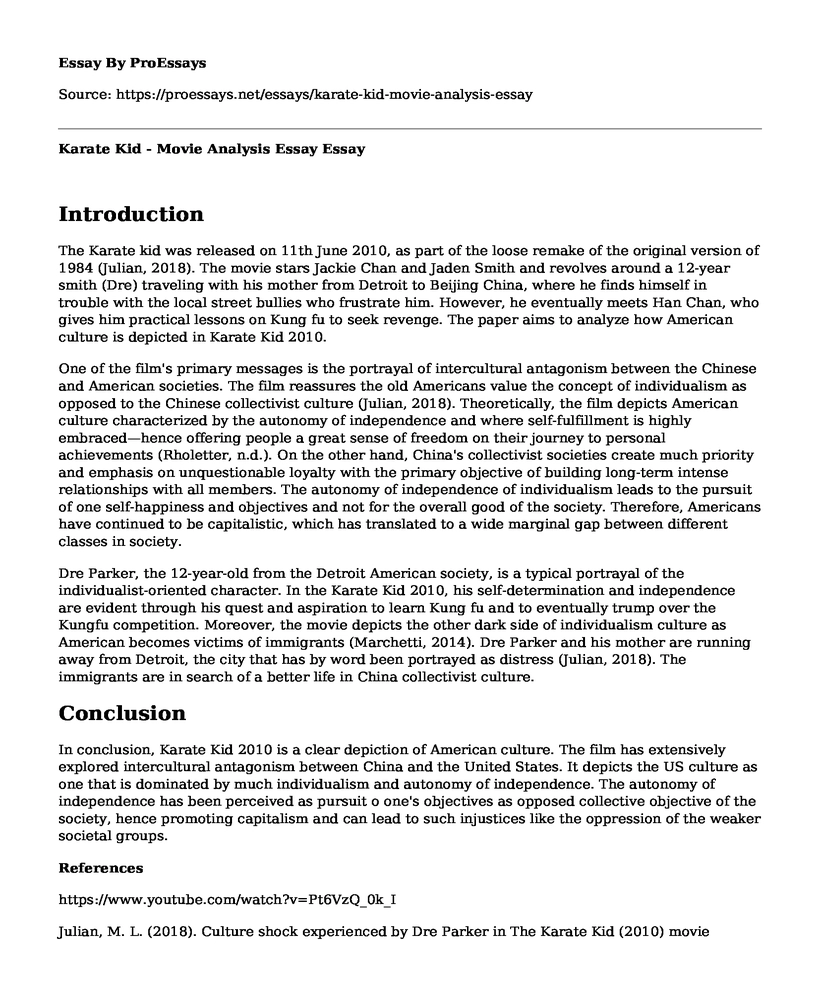Introduction
The Karate kid was released on 11th June 2010, as part of the loose remake of the original version of 1984 (Julian, 2018). The movie stars Jackie Chan and Jaden Smith and revolves around a 12-year smith (Dre) traveling with his mother from Detroit to Beijing China, where he finds himself in trouble with the local street bullies who frustrate him. However, he eventually meets Han Chan, who gives him practical lessons on Kung fu to seek revenge. The paper aims to analyze how American culture is depicted in Karate Kid 2010.
One of the film's primary messages is the portrayal of intercultural antagonism between the Chinese and American societies. The film reassures the old Americans value the concept of individualism as opposed to the Chinese collectivist culture (Julian, 2018). Theoretically, the film depicts American culture characterized by the autonomy of independence and where self-fulfillment is highly embraced—hence offering people a great sense of freedom on their journey to personal achievements (Rholetter, n.d.). On the other hand, China's collectivist societies create much priority and emphasis on unquestionable loyalty with the primary objective of building long-term intense relationships with all members. The autonomy of independence of individualism leads to the pursuit of one self-happiness and objectives and not for the overall good of the society. Therefore, Americans have continued to be capitalistic, which has translated to a wide marginal gap between different classes in society.
Dre Parker, the 12-year-old from the Detroit American society, is a typical portrayal of the individualist-oriented character. In the Karate Kid 2010, his self-determination and independence are evident through his quest and aspiration to learn Kung fu and to eventually trump over the Kungfu competition. Moreover, the movie depicts the other dark side of individualism culture as American becomes victims of immigrants (Marchetti, 2014). Dre Parker and his mother are running away from Detroit, the city that has by word been portrayed as distress (Julian, 2018). The immigrants are in search of a better life in China collectivist culture.
Conclusion
In conclusion, Karate Kid 2010 is a clear depiction of American culture. The film has extensively explored intercultural antagonism between China and the United States. It depicts the US culture as one that is dominated by much individualism and autonomy of independence. The autonomy of independence has been perceived as pursuit o one's objectives as opposed collective objective of the society, hence promoting capitalism and can lead to such injustices like the oppression of the weaker societal groups.
References
https://www.youtube.com/watch?v=Pt6VzQ_0k_I
Julian, M. L. (2018). Culture shock experienced by Dre Parker in The Karate Kid (2010) movie (Doctoral dissertation, UIN Sunan Gunung Djati Bandung). Doi.org/10.15575/al-tsaqafa. v15i2.3822
Marchetti, G. (2014). Does the karate kid have a Kung Fu dream? Hong Kong martial arts; between Hollywood and Beijing. JOMEC Journal, 0(5). Doi.org/10.18573/j.2014.10273
Rholetter, W. (n.d.). Karate kid, the. Multicultural America: A Multimedia Encyclopedia. Doi.org/10.4135/9781452276274.n497
Cite this page
Karate Kid - Movie Analysis Essay. (2023, Aug 22). Retrieved from https://proessays.net/essays/karate-kid-movie-analysis-essay
If you are the original author of this essay and no longer wish to have it published on the ProEssays website, please click below to request its removal:
- Values and Trials of Facebook to Children Essay
- Film Analysis Essay on "Paradise Now"
- Essay Sample on Understanding Cultures Through Film: A Blessing and a Curse?
- Essay Sample on Nude Figure Art in Western Cultures: Meaning and Practices
- Black Hip Hop: Addressing Inequality Through Music - Essay Sample
- TED Talks: Inspiring Ideas for a Global Audience - Essay Sample
- Paper Example on 12-Year-Old's Scream Captured in Pulitzer-Winning Photo of Suicide Bombing







